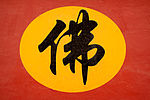Guīfēng Zōngmì | |
|---|---|
圭峰宗密 | |
 | |
| Title | Samādhi-Prajnā Chan Master |
| Personal | |
| Born | 780 |
| Died | 1 February 841 (aged 60–61) |
| Religion | Mahayana Buddhism |
| School | Heze school (Southern Chan) and Huayan school |
| Lineage | Heze Chan lineage of Heze Shenhui through Suizhou Daoyuan; Huayan lineage via Qingliang Chengguan |
| Organization | |
| Order | Chan Buddhism, Huayan |
| Part of a series on |
| Chinese Buddhism |
|---|
 |
| Part of a series on |
| Buddhism |
|---|
 |
Guifeng Zongmi (Chinese: 圭峰宗密; pinyin: Guīfēng Zōngmì; Japanese pronunciation: Keihō Shūmitsu) (780–1 February 841) was a Tang dynasty Chinese Buddhist monk and scholar who is considered a patriarch of both the Huayan school and Chan Buddhism.[1] Zongmi wrote a number of works on several Mahayana Sutras, Chan and Huayan, and he also discussed Taoism and Confucianism. His works are a major source for studying the various Chan schools of the Tang.[2]
Zongmi was deeply interested in both the practical and doctrinal aspects of Mahayana Buddhism, especially the teachings of the Sutra of Perfect Enlightenment and the Mahayana Awakening of Faith. Zongmi's work is concerned with harmonizing the various Chan teachings (especially the doctrines of sudden awakening and original enlightenment) with other Chinese Buddhist traditions, especially Huayan, though he also drew on the work of Tiantai Zhiyi in his ritual works. His philosophy attempts to create a comprehensive worldview that includes and sublimates all Buddhist and non-buddhist teachings of his time into a single harmonious spiritual vision.
- ^ Gregory 2002, p. 3.
- ^ Gregory 2002, p. 17.